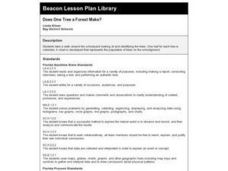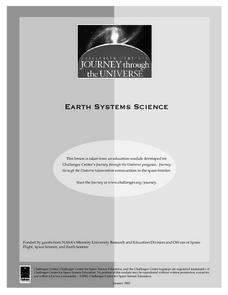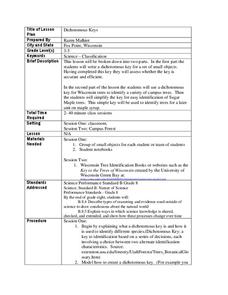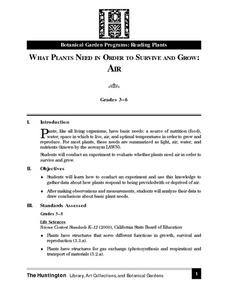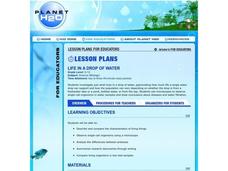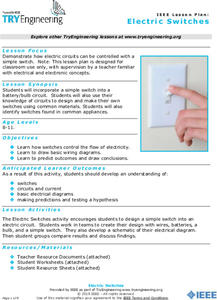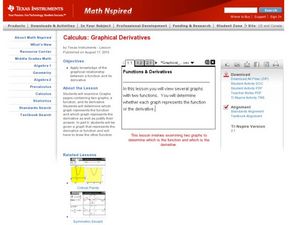Curated OER
Does One Tree a Forest Make?
Students take a walk around the schoolyard looking at and identifying the trees. One leaf for each tree is collected. A chart is developed that represents the population of trees on the school ground. They keep journals and write an essay.
Curated OER
Gas Laws and Alka-Seltzer Rockets
Students investigate the Ideal Gas Law. In this three states of matter lesson plan, students create Alka-Seltzer rockets using film canisters. Students record observations and data according to the scientific method and explain the gas...
Curated OER
Plate Tectonics: Movin' and Shakin'
Young scholars are introduced to the causes of plate movements and the hazards they present. They plot the location of 50 earthquakes and 50 volcanic eruptions on a map and explore the relationships between plate tectonics, earthquakes,...
Curated OER
"ART ZOO 'Blacks in the Westward Movement', 'What Can You Do with a Portrait', and 'Of Beetles, Worms, and Leaves of Grass'"
Students study black history, examine portraits and portrait making and create their own portraits, and investigate their natural environment. This humanities lesson provides a text that can be used to teach lessons in black history,...
Curated OER
Dichotomous Keys
Students utilize dichotomous keys to identify trees in their schools. In this ecological identification lesson plan, students practice creating dichotomous keys based on simple subjects such as hair color or sex of a person. Students...
Curated OER
What Plants Need in Order to Survive and Grow: Air
Young scholars conduct an experiment to determine whether plants need air in order to survive and grow. They discuss natural resources, analyze slides, and observe and record data from the experiment.
Curated OER
Life in a Drop of Water
Students examine the structure, function, and characteristics of microscopic organisms that inhabit freshwater through collection of water samples and observation through microscopes.
Curated OER
Conduction, Convection, Radiation, Oh My!
Middle schoolers draw a line graph, and use graphing as a tool to discover more about conduction, convection and radiation. They should design their own experiment using heat sensitive paper to show they explain these 3 processes.
Curated OER
Classroom Meteorologists: An Experiential Approach to Learning about Seasons and Weather
Students examine several concepts about weather in the seven lessons of this unit. This year long activity helps students to gather data seasonally about wind, clouds, precipitation, and temperature. Earth's three climate zones are...
Curated OER
Food Chains
Fourth graders study food chains, producers, consumers, and decomposers. They play a food chain game and create food chain mobiles or posters. They take a nature hike around the school and observe various parts of a food chain.
Institute of Electrical and Electronics Engineers
Electric Switches
Students examine how electric circuits are controlled with a switch. They incorporate a switch into a battery/bulb circuit. They design and create their own switches using everyday materials.
Curated OER
Truss Strength
Students are introduced to the design of Old Faithful Lodge at Yellowstone Park including its use of trusses. They work in groups and use straws and modeling clay to design and test a variety of building supports.
Curated OER
Dripping Wet or Dry as a Bone?
Young scholars use a sponge and water model to explore the concept of relative humidity and create a percent scale. They define humidity and saturation, build a simple humidity/saturation model, collect, predict and interpret data, and...
Texas Instruments
Graphical Derivatives
Pupils solve functions using the derivative. They determine the derivative of a function based on its graph, then analyze different functions and draw a relationship and conclusion based on the graph.
Curated OER
It's Rainin', It's Pouring
Students take a quick examine part of the water cycle, and the combined gas laws. The instructional activity lead them through the conditions necessary for cloud formation and allow them to create clouds in three different hands-on...
Curated OER
Basic Needs of Plants
Second graders conduct a plant experiment. In this basic needs of plants lesson plan, 2nd graders observe plants for two weeks. Students record data from their plants in journals.
Curated OER
A New Slant On The Seasons
Students identify how the tilt and position of the Earth causes the seasons. After a discussion of the seasons and when they begin. Using themselves as the objects in the universe, they role play how the rotational movement of the...
Curated OER
Activity on United States Moon Landing: Apollo 11
Learners use the World Wide Web to access additional information needed to complete a set of questions. They demonstrate an understanding of latitude and longitude by interpreting a lunar map.
Curated OER
TE Lesson: Habitat Mapping
Students examine the current technologies used in mapping resources in the marine environment. They look at remote sensing, sounding, and underwater vehicles. They examine image from the benthic habitat produced by the GIS in order to...
Curated OER
An Episode on Australian Animals
Fifth graders identify and analyze various ecological regions of Australia in order to identify more about some of the animals that inhabit the area. Students record information they discover on a chart provided that is assessed at end...
Curated OER
The Solution to Pollution is Dilution
High schoolers consider what happens to herbicides or insecticides that are used in agricultural practices, especially herbicides that are used to control noxious weeds. They become acquaint with a chemical assessment method known as...
Curated OER
DNA Models
Students create DNA models. Using puzzle pieces to represent the parts of a DNA strand, they put together a segment of DNA. Once everyone has completed their individual strand, they being linking with other students using tape. Class...
Curated OER
Salt Marsh in a Pan
Young scholars create a model of a salt marsh to discover the impact of pollution and human activities on water-based habitats including bays and the ocean. They recognize the relationship between natural and developed areas. Students...



